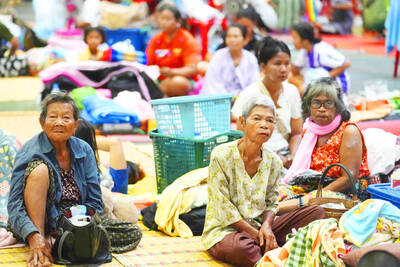Pakistan and India exchanged lists yesterday of their nuclear installations under an accord aimed at protecting the sites in case of war, officials said, amid simmering tensions over the Mumbai attacks.
The South Asian rivals, whose relations have been rocky since the deadly November attacks on India’s financial center Mumbai, have exchanged the lists annually since 1992, under an agreement that came into force the previous year.
“The lists have been exchanged at the foreign ministries in New Delhi and Islamabad,” a spokesman for the foreign office in Islamabad, Mohammad Sadiq, said.
Under the agreement, both sides are to refrain from attacking nuclear facilities in the event of a war. The neighbors have also set up a telephone hotline to prevent accidental nuclear conflict.
India and Pakistan have fought three wars, two of them over the Himalayan region of Kashmir, which is divided between them but claimed in full by both.
The two countries came close to another war in 2002 after an attack on the Indian parliament that New Delhi blamed on the Pakistan-based militant group Lashkar-e-Taiba — the same group it blames for the carnage in Mumbai.
But after deploying hundreds of thousands of troops to the border, Islamabad and New Delhi retreated following intense international mediation. In 2004, they launched a peace process, but that is now on hold following the Mumbai attacks.
US President George W. Bush on Wednesday spoke with Indian Prime Minister Manmohan Singh and Pakistani President Asif Ali Zardari. The White House said all had agreed on the need to avoid any increase in tensions.
Pakistan on Tuesday asked India to resume dialogue and urged New Delhi to deactivate its forward air bases and redeploy troops to peacetime locations, but India denied it had moved troops into offensive positions on the border.
India conducted nuclear weapons tests in May 1998. Pakistan, in a tit-for-tat response, detonated its own devices a few days later. In October 2005, the two sides formalized an agreement on pre-notification of ballistic missile tests.

FOREST SITE: A rescue helicopter spotted the burning fuselage of the plane in a forested area, with rescue personnel saying they saw no evidence of survivors A passenger plane carrying nearly 50 people crashed yesterday in a remote spot in Russia’s far eastern region of Amur, with no immediate signs of survivors, authorities said. The aircraft, a twin-propeller Antonov-24 operated by Angara Airlines, was headed to the town of Tynda from the city of Blagoveshchensk when it disappeared from radar at about 1pm. A rescue helicopter later spotted the burning fuselage of the plane on a forested mountain slope about 16km from Tynda. Videos published by Russian investigators showed what appeared to be columns of smoke billowing from the wreckage of the plane in a dense, forested area. Rescuers in

‘ARBITRARY’ CASE: Former DR Congo president Joseph Kabila has maintained his innocence and called the country’s courts an instrument of oppression Former Democratic Republic of the Congo (DR Congo) president Joseph Kabila went on trial in absentia on Friday on charges including treason over alleged support for Rwanda-backed militants, an AFP reporter at the court said. Kabila, who has lived outside the DR Congo for two years, stands accused at a military court of plotting to overthrow the government of Congolese President Felix Tshisekedi — a charge that could yield a death sentence. He also faces charges including homicide, torture and rape linked to the anti-government force M23, the charge sheet said. Other charges include “taking part in an insurrection movement,” “crime against the

POINTING FINGERS: The two countries have accused each other of firing first, with Bangkok accusing Phnom Penh of targeting civilian infrastructure, including a hospital Thai acting Prime Minister Phumtham Wechayachai yesterday warned that cross-border clashes with Cambodia that have uprooted more than 130,000 people “could develop into war,” as the countries traded deadly strikes for a second day. A long-running border dispute erupted into intense fighting with jets, artillery, tanks and ground troops on Thursday, and the UN Security Council was set to hold an emergency meeting on the crisis yesterday. A steady thump of artillery strikes could be heard from the Cambodian side of the border, where the province of Oddar Meanchey reported that one civilian — a 70-year-old man — had been killed and

Philippine President Ferdinand Marcos Jr is to meet US President Donald Trump this week, hoping Manila’s status as a key Asian ally would secure a more favorable trade deal before the deadline on Friday next week. Marcos would be the first Southeast Asian leader to meet Trump in his second term. Trump has already struck trade deals with two of Manila’s regional partners, Vietnam and Indonesia, driving tough bargains in trade talks even with close allies that Washington needs to keep onside in its strategic rivalry with China. “I expect our discussions to focus on security and defense, of course, but also